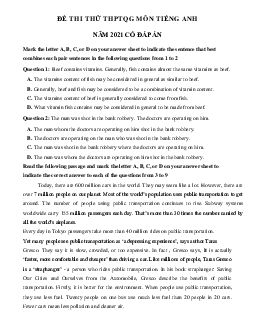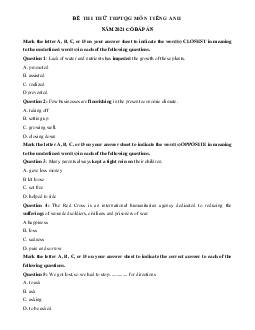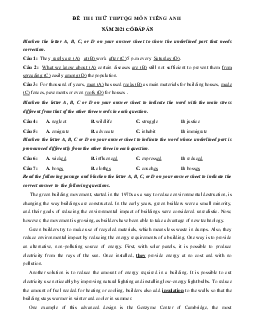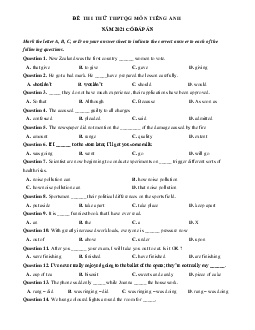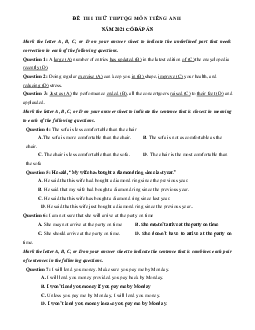







Preview text:
ĐỀ THI THỬ THPTQG MÔN TIẾNG ANH
NĂM 2021 CÓ ĐÁP ÁN
Mark the letter A, B, C or D on your answer sheet to indicate the correct answer to each of the
following questions from 1 to 15.
Question 1 (NB): Lady Gaga is an American singer, songwriter and actress, ______?
A. doesn't she B. hasn't she C. won't she D. isn't she
Question 2 (TH): On our trip to Spain, we crossed ______ Atlantic Ocean.
A. x B. a C. the D. an
Question 3 (TH): She likes reading books ______ the library.
A. on B. at C. in D. from
Question 4 (TH): The government suggests ______ robots to access remote areas that are dangerous to the lives of militants.
A. to design B. designing C. design D. designed
Question 5 (NB): If the bride's father ______ the car, she would be at the Church now.
A. has B. had C. will have D. would have
Question 6 (TH): Since Helen ______ 10 years old, she has mastered Braille as well as the manual
alphabet and even learned to use the typewriter.
A. was B. were C. will be D. has been
Question 7 (TH): People should stop smoking ______ it is extremely detrimental to health.
A. although B. despite C. because of D. because
Question 8 (TH): She will take management training course ______.
A. as soon as the epidemic was controlled B. when the epidemic had been controlled
C. until the epidemic will be controlled D. right after the epidemic has been controlled
Question 9 (TH): You can't expect ______ a foreign language in a few months.
A. learn B. learning C. to learn D. to learning
Question 10 (TH): Good students aren't ______ intelligent students.
A. necessity B. unnecessary C. necessary D. necessarily
Question 11 (VD): He ______ some excuse about his daughter being sick.
A. broke in B. made up C. run across D. took after
Question 12 (VD): The US president Barack Obama ______ an official visit to Vietnam in May 2016,
which is of great significance to the comprehensive bilateral partnership.
A. delivered B. paid C. offered D. gave
Question 13 (TH): The ______ of toothpaste are located in the health and beauty section of the supermarket.
A. pints B. tubes C. quarts D. sticks
Question 14 (TH): There is no longer the ______ use of animals to test products. Only some are used.
A. expansive B. intensive C. extensive D. tentative
Question 15 (VDC): Alex dreams of going on tour – he's just waiting for his big ______ to get his foot
in the door of the music industry.
A. break B. cheese C. cake D. deal
Read the following passage and mark the letter A, B, C, or D on your answer sheet to indicate the
correct word or phrase that best fits each of the numbered blanks from 16 to 20.
Dressing up in costumes and trick-or-treating are popular Halloween activities, but few probably (16)
______ these lighthearted fall traditions with their origins in Samhain, a three-day ancient Celtic pagan festival.
For the Celts, who lived during the Iron Age in what is now Ireland, Scotland, the U.K. and (17) ______
parts of Northern Europe, Samhain (meaning literally, in modern Irish, “summer's end”) marked the
end of summer and kicked off the Celtic new year. Ushering in a new year signaled a time of both death
and rebirth, something that was doubly symbolic because it (18) ______ with the end of a bountiful
harvest season and the beginning of a cold and dark winter season that would present plenty of challenges.
Eventually, Halloween became more popular in secular culture than All Saints' Day. The pagan-turned-
Christian practices of dressing up in costumes, playing pranks and handing out offerings have evolved
into popular traditions even for those (19) ______ may not believe in otherworldly spirits or saints. (20)
______, whether Halloween celebrants know it or not, they’re following the legacy of the ancient Celts
who, with the festival of Samhain, celebrated the inevitability of death and rebirth.
Question 16 (VD): A. separate B. estimate C. associate D. celebrate
Question 17 (TH): A. each B. every C. another D. other
Question 18 (TH): A. coincided B. originated C. compared D. occurred
Question 19 (TH):A. which B. whom C. who D. what
Question 20 (TH): A. Moreover B. However C. Instead D. Therefore
Mark the letter A, B, C, or D on your answer sheet to indicate the sentence that best completes each
of the following exchanges from 21 to 22.
Question 21 (TH): Mary is talking to her professor in his office.
- Mary: “Can you tell me how to find material for my science report, professor?”
- Professor: “__________”
A. Try your best, Mary. B. You mean the podcasts from other students?
C. You can borrow books from the library. D. I like it that you understand.
Question 22 (TH): – Tom: “Who's going to win the contest?” – Jerry: “______________.”
A. There's nothing you don't know about beauty
B. Your guess is as good as mine
C. It might be a good idea to bet
D. I've set my heart on winning it
Mark the letter A, B, C, or D on your answer sheet to indicate the word(s) CLOSEST in meaning to
the underlined word(s) in each of the following questions from 23 to 24.
Question 23 (TH): The student service centre will try their best to assist students in finding a suitable part-time job.
A. employ B. help C. make D. allow
Question 24 (TH): She was brought up in a well-off family. She can't understand the problems we are facing.
A. wealthy B. kind C. broke D. comfortable
Mark the letter A, B, C or D on your answer sheet to show the underlined part that needs correction
in each of the following questions from 25 to 27.
Question 25 (TH): Facebook allow you to send messages and post status updates to keep in touch with friends and family.
A. and B. to keep C. allow D. status updates
Question 26 (TH): Many places of history, scientific, cultural, or scenic importance have been
designated national monuments.
A. history B. cultural C. have D. been designated
Question 27 (TH): Just as the performance ended, all the concertgoers raised to their feet and applauded.
A. raised B. Just as C. their feet D. ended
Mark the letter A, B, C, or D on your answer sheet to indicate the sentence that is closest in meaning
to each of the following questions from 28 to 30.
Question 28 (TH): Helen's boss earns more money than she does.
A. Helen doesn't earn as much money as her boss.
B. Helen's boss earns as much as she does.
C. Helen earns more money than her boss.
D. Helen's boss earns less money than she does.
Question 29 (TH): Cindy said that “I haven't seen John since last month.”
A. Cindy said she wasn't seen John since the previous month.
B. Cindy said she hadn't seen John since the previous month.
C. Cindy said she hasn't seen John since last month.
D. Cindy said I hadn't seen John since the previous month.
Question 30 (VD): John is not here, perhaps he is ill.
A. Because of his illness, John shouldn't have been here.
B. John might be ill, so he is not here.
C. John must be ill, so he is not here.
D. John needn't be here because he is ill.
Mark the letter A, B, C or D on your answer sheet to indicate the word that differs from the rest in
the position of the main stress in each of the following questions from 31 to 32.
Question 31 (NB): A. effort B. actor C. perform D. area
Question 32 (NB): A. disappear B. recommend C. entertain D. fortunate
Mark the letter A, B, C, or D on your answer sheet to indicate the sentence that best combines each
of sentences in the following questions from 33 to 34.
Question 33 (VDC): You can go out with your friends. Make sure you finish your homework by 5 p.m.
A. As long as you finish your homework by 5 p.m., you can go out with your friends.
B. You cannot go out with your friends provided you finish your homework by 5 p.m.
C. You can't go out with your friends in case you cannot finish your homework by 5 p.m.
D. Unless you finish your homework by 5 p.m., you can go out with your friends.
Question 34 (VDC): He has great intelligence. He can solve all the problems very quickly.
A. So intelligent a student is he that he can solve all the problems very quickly.
B. An intelligent student is he that he can solve all the problems very quickly.
C. So intelligent is he that he can solve all the problems very quickly.
D. He is very intelligent that he can solve all the problems very quickly.
Read the following passage and mark the letter A, B, C, or D on your answer sheer to indicate the
correct answer to each of the questions from 35 to 39.
As customers choose brands based on how they make them feel, rather than their actual products or
services, there is an intrinsic advantage to those organizations who use designed experiences as a
weapon to cut through the most competitive of markets. Those that don't, operate in what we call the
“experience gap”, the space between them and their customer's expectation of them. Make no mistake,
in our high paced and digitally connected economies, the experience gap is driving markets, fast.
For example, take Instagram and Twitter. These brands filled the demand for a whole new human
experience that did not exist before the evolution of digital technologies enabled that. They were
pioneers, and there were no established players to unseat. But we are also seeing a similar dynamic in
existing industries. New entrants are coming in and taking the space, also using whole new experiences,
purely because the incumbents left the door open.
Closer to home, this can be seen with Australian neobanks who are giving customers a better experience
than the incumbents. Robert Bell is the CEO at neobank 86400. He says banking has already become
quite complicated and he wanted to make a change. His neobank is working to solve customers’
problems more holistically. Bell said, “It's significantly harder work and takes more time to become a
bank, but having done that we can have a much better relationship with our customers and we can offer
them a lot more products and services.”
Think about that for a moment. Do you notice how better experiences, leads to better relationships,
which is then the stepping stone for more offerings? Many brands still jump straight to modified
offerings, without gaining that customer connection and the necessary foundation of trust first.
(Source: https://which-50.com/)
Question 35 (VD): What does the passage mainly discuss?
A. The importance of experience to competitive advantage.
B. Businesses are unwilling to disrupt themselves.
C. A far-reaching cultural transformation.
D. Knowledge drives behavior, loyalty, satisfaction.
Question 36 (TH): The word “them” in paragraph 1 refers to _______.
A. brands B. economies C. customers D. markets
Question 37 (TH): According to paragraph 2, what is true about Instagram and Twitter in the stated instance?
A. They are the one and only companies providing such revolutionary services.
B. Prior to their advent, there were already several competitors in the field.
C. They were the trailblazers for the experience-oriented marketing strategy.
D. Their reputation famously preceded even the 4th Industrial Revolution.
Question 38 (TH): According to paragraph 3, what is the attitude of Robert Bell towards the customers?
A. He views them as the golden goose for his business.
B. He displays worship in its purest form towards them.
C. He sees them as modern slaves to consumerism.
D. He maintains a healthy relationship of give and take.
Question 39 (TH): What does the phrase “stepping stone” in paragraph 4 mean?
A. An important clue to understanding something that is challenging or puzzling.
B. An asset or possession prized as being the best of a group of similar things.
C. A person who travels without settling down for any significant period of time
D. An action or event that helps one to make progress towards a specified goal.
Mark the letter A, B, C or D on your answer sheet to indicate the word whose underlined part is
pronounced differently from that of the rest in each of the following questions from 40 to 41.
Question 40 (NB): A. jumps B. arrives C. follows D. rains
Question 41 (NB): A. effect B. enter C. restore D. engage
Read the following passage and mark the letter A, B, C or D on your answer sheet to indicate the
correct answer to each of the questions from 42 to 48.
Nepal has made important progress over the past few years to promote equality, but the country still has
one of the highest rates of child marriage in the world. 41% of Nepalese girls are married before the age of 18.
Poverty is both a cause and consequence of child marriage in Nepal. Girls from the wealthiest families
marry 2 years later than those from the poorest, who are seen as an economic burden, and who drop out
of school and earn little money.
Food insecurity plays an important role too. Nepalese families that do not have enough food to eat are
more likely to marry their daughters at a young age to decrease the financial burden. One study shows
that 91% of people who had secure access to food married over the age of 19.
Dowry is also a common practice in many communities. Parents marry their daughters as soon as
possible because the money they have to pay for the groom's family is higher if their daughter is older.
Since 2010, the legal age of marriage is 20 for both men and women, or 18 with parental consent,
according to the Nepalese Country Code.
The law states that punishment for child marriage is imprisonment for up to three years and a fine of
up to 10,000 rupees (£102). But reports suggest that this law is rarely applied. There has been quite a lot
of progress in Nepal over the past 3 years with a clear government commitment to ending child
marriage and civil society cooperation. The Ministry of Women, Children and Social Welfare is
currently developing Nepal's first national strategy on child marriage in collaboration with UNICEF
Nepal and Girls Not Brides Nepal. However, the post-earthquake and post-fuel crisis environment has
meant progress is slow and the national strategy has been delayed.
(Adapted from http://www.girlsnotbrides.org/)
Question 42 (VD): Which of the following best serves as the title for the passage?
A. Nepal Government in an attempt to reduce social inequality.
B. Child marriage - A completely tractable problem in Nepal.
C. Nepal's strategies to child protection programming.
D. One type of child abuse in Nepal: Child Marriage.
Question 43 (TH): According to paragraph 2, in Nepal, girls from needy families _______.
A. play an important role in bolstering their household finances
B. can get married two years later than those are from poor families
C. are forced to drop out of school because their parents have no money
D. have to get married earlier than those are from affluent families
Question 44 (TH): The word “those” in paragraph 2 refers to _______.
A. girls B. years C. rates D. families
Question 45 (TH): The word “burden” in paragraph 3 is closest in meaning to _______.
A. potency B. load C. cargo D. issue
Question 46 (TH): The word “imprisonment” in the last paragraph could be best replaced by _______.
A. salvation B. custody C. detention D. emblem
Question 47 (VD): According to the passage, which of the following statements is NOT true?
A. Parents who marry their children before the allowed age normally pay a fine.
B. The age of marriage in Nepal depends on the money the families have.
C. According to the law, if people have their parents' permission, they are allowed to marry at 18.
D. Nepalese families have a tendency to marry their daughters at a young age.
Question 48 (VDC): It can be inferred from the passage _______.
A. Nepal had the highest overall prevalence of child marriage in the world
B. The recent earthquake was negative for the eradication of child marriage
C. Families want to marry their daughters soon to earn money
D. The government is not doing much to put an end to child marriage
Mark the letter A, B, C or D on your answer sheet to indicate the word(s) OPPOSITE in meaning to
the underlined word(s) in each of the following questions from 49 to 50.
Question 49 (TH): Thousands are going starving because of the failure of this year's harvest.
A. rich B. hungry C. poor D. full
Question 50 (VDC): Tom was too wet behind the ears to be in charge of such a difficult task.
A. full of sincerity B. without money
C. lack of responsibility D. full of experience ĐÁP ÁN 1-D 2-C 3-C 4-B 5-B 6-A 7-D 8-D 9-C 10-D 11-B 12-B 13-B 14-C 15-A 16-C 17-D 18-A 19-C 20-B 21-C 22-B 23-B 24-A 25-C 26-A 27-A 28-A 29-B 30-B 31-C 32-D 33-A 34-C 35-A 36-C 37-C 38-D 39-D 40-A 41-B 42-D 43-D 44-A 45-B 46-C 47-A 48-B 49-D 50-D
